 With no less than eleven Sultans, a Portuguese period, a brief British barrage, the ominous Ottoman Empire, a bloody independence coup and a tenuous agreement with Tanganyika forming the United Republic of Tanzania, the indigenous inhabitants of Zanzibar have been shaped culturally, politically and economically by the dubious human nature of trade and travel since the first millenia when African Bantu-speakers arrived on the island archipelago. The "spice islands" are legendary and are comprised of two large islands, Unguja (the Swahili name for the island more often called Zanzibar) and Pemba, as well as numerous satellite islands that surround the two giants making up the Zanzibar Archipelago. We travelled to Unguja only, which I will refer to as Zanzibar, and stayed in Zanzibar Town and more specifically in Old Stone Town (a UNESCO World Heritage Site comprised of the cultural and historical "soul" of Zanzibar).
With no less than eleven Sultans, a Portuguese period, a brief British barrage, the ominous Ottoman Empire, a bloody independence coup and a tenuous agreement with Tanganyika forming the United Republic of Tanzania, the indigenous inhabitants of Zanzibar have been shaped culturally, politically and economically by the dubious human nature of trade and travel since the first millenia when African Bantu-speakers arrived on the island archipelago. The "spice islands" are legendary and are comprised of two large islands, Unguja (the Swahili name for the island more often called Zanzibar) and Pemba, as well as numerous satellite islands that surround the two giants making up the Zanzibar Archipelago. We travelled to Unguja only, which I will refer to as Zanzibar, and stayed in Zanzibar Town and more specifically in Old Stone Town (a UNESCO World Heritage Site comprised of the cultural and historical "soul" of Zanzibar).It is fair to attempt to address the archipelago's human history, although it is impossible to t
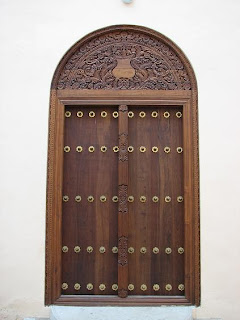
However, independence did not mean that the formal economically entrenched colonist would
 Ben and I arrived a bit road wary, having taken a bus from Kampala, Uganda to Arusha, Tanzania via Kenya and having dealt with all that happens at the borders, on the over-crowded buses and the pushy touts. We had spent well over 22 hours on that bus and faced another grizzly ride from Arusha to the coast, so we did what our backs, our backsides and our patience would allow....took a plane. It was amazing to see Tanzania pass under an almost cloudless sky from Arusha, home of Mt. Meru, to the coast. We saw multiple dirt devils, twisting the eroded featureless grasslands, we saw the tale-tale signs of irrigated farmlands (a green splash on a dusty brown moonscape) and the Rift Valley which soon gave way to large coastal towns such as Dar Salaam. One we checked into our hotel in the winding narrow streets of Stone Town we tended to needs such as food and a haircut for Ben. We quite often satisfied our hunger in the afternoon
Ben and I arrived a bit road wary, having taken a bus from Kampala, Uganda to Arusha, Tanzania via Kenya and having dealt with all that happens at the borders, on the over-crowded buses and the pushy touts. We had spent well over 22 hours on that bus and faced another grizzly ride from Arusha to the coast, so we did what our backs, our backsides and our patience would allow....took a plane. It was amazing to see Tanzania pass under an almost cloudless sky from Arusha, home of Mt. Meru, to the coast. We saw multiple dirt devils, twisting the eroded featureless grasslands, we saw the tale-tale signs of irrigated farmlands (a green splash on a dusty brown moonscape) and the Rift Valley which soon gave way to large coastal towns such as Dar Salaam. One we checked into our hotel in the winding narrow streets of Stone Town we tended to needs such as food and a haircut for Ben. We quite often satisfied our hunger in the afternoon  hours down on the sea shore, where vendors fried, boiled and grilled everything you could imagine from the sea. Fishermen, among the dizzying noise of fish sizzle on fire, crowds wheeling-n-dealing and shouts of advertisement to the family table, served up a variety of fish, shark, octopus, squid and compliments of chapati, vegetables and baked sweets. We splurged a few times and visited local restaurants, varying from Indian, Swahili, Sea Food to Asian, always with the same results...some of the best food we were to enjoy on our trip. From spiced coffees, Swahili sweet cakes (hawa), Tsatsiki, and Indian Marsala dishes to road-side roasted octopus, the food rivals some of the best I have had in my traveling experience (with none of the travelers regret in the bathroom the next day). Strolling back from our night excursion, we found a rather empty local "barber shop" with about four Zanzibari youth, stylishly clad in baggy jeans and hip-hop T's smiling inside..."Haircut for 4,000 Shillings ($3.50 USD)?" Sure why not. It was very interesting, Ben got the haircut of a lifetime, the care and precision I have never before witnessed, and I got to sit on the stairs among the Americana poster clad shop (sports heroes, rap singers looking on) and chat with three very nice young Zanzibari men. We talked about America, where we were from, how we found Zanzibar and did I know Lebron James (after all he is from Ohio). I really enjoyed my days winding through these streets of sweet eats, touts, and shopkeepers.
hours down on the sea shore, where vendors fried, boiled and grilled everything you could imagine from the sea. Fishermen, among the dizzying noise of fish sizzle on fire, crowds wheeling-n-dealing and shouts of advertisement to the family table, served up a variety of fish, shark, octopus, squid and compliments of chapati, vegetables and baked sweets. We splurged a few times and visited local restaurants, varying from Indian, Swahili, Sea Food to Asian, always with the same results...some of the best food we were to enjoy on our trip. From spiced coffees, Swahili sweet cakes (hawa), Tsatsiki, and Indian Marsala dishes to road-side roasted octopus, the food rivals some of the best I have had in my traveling experience (with none of the travelers regret in the bathroom the next day). Strolling back from our night excursion, we found a rather empty local "barber shop" with about four Zanzibari youth, stylishly clad in baggy jeans and hip-hop T's smiling inside..."Haircut for 4,000 Shillings ($3.50 USD)?" Sure why not. It was very interesting, Ben got the haircut of a lifetime, the care and precision I have never before witnessed, and I got to sit on the stairs among the Americana poster clad shop (sports heroes, rap singers looking on) and chat with three very nice young Zanzibari men. We talked about America, where we were from, how we found Zanzibar and did I know Lebron James (after all he is from Ohio). I really enjoyed my days winding through these streets of sweet eats, touts, and shopkeepers. Old Stone Town itself is a labyrinth of smells, sights, shops and homes in various states of decay. The streets cobbled and generally too narrow for cars, with the exception of one street which a single car will race pass narrowly missing pedestrians, bicycles, good laden carts and barely squeezing onto someones porch to allow a car to pass the other way, wound in no particular pattern through the town. They have maps available but it is much more desirable to wander aimlessly knowing that you will either hit the sea or the major road and market, both of which signal Stone Town's end. All women from Zanzibar are dressed hair covered in Islamic fashion with a hijab (scarf loosely covering the hair and wrapping under the chin), with a few electing to wear the burka (full face, hands and body covering), and men also varying in their wear from simply a Sunni Islamic hat to the full robe. I would want no one to think that this is not a tolerant group of people however, there were many a scantily clad tourists walking around, oblivious to local sensitivities.
Old Stone Town itself is a labyrinth of smells, sights, shops and homes in various states of decay. The streets cobbled and generally too narrow for cars, with the exception of one street which a single car will race pass narrowly missing pedestrians, bicycles, good laden carts and barely squeezing onto someones porch to allow a car to pass the other way, wound in no particular pattern through the town. They have maps available but it is much more desirable to wander aimlessly knowing that you will either hit the sea or the major road and market, both of which signal Stone Town's end. All women from Zanzibar are dressed hair covered in Islamic fashion with a hijab (scarf loosely covering the hair and wrapping under the chin), with a few electing to wear the burka (full face, hands and body covering), and men also varying in their wear from simply a Sunni Islamic hat to the full robe. I would want no one to think that this is not a tolerant group of people however, there were many a scantily clad tourists walking around, oblivious to local sensitivities.  We decided that we would take a trip to the interior of the island to visit the famed "Jozani Forest Reserve," so we jumped in the back of a local covered transport truck. It was our first trip to see the rest of Zanzibar's urban area and pass into the rural areas, once covered in plantations. The trip itself was adventuresome, we passed a large painting of a pathetic and patriotic looking Saddam Hussein after his capture, we passed crowded markets of people bartering for clothing for the children as required by upcoming Ramadan. And of course the one man that knew any English on the overcrowded truck, wanted us to pay for his fare...hmm. The whole time we are unsure of whether the truck knows where we wanted to go and wondering if we know where to jump off.
We decided that we would take a trip to the interior of the island to visit the famed "Jozani Forest Reserve," so we jumped in the back of a local covered transport truck. It was our first trip to see the rest of Zanzibar's urban area and pass into the rural areas, once covered in plantations. The trip itself was adventuresome, we passed a large painting of a pathetic and patriotic looking Saddam Hussein after his capture, we passed crowded markets of people bartering for clothing for the children as required by upcoming Ramadan. And of course the one man that knew any English on the overcrowded truck, wanted us to pay for his fare...hmm. The whole time we are unsure of whether the truck knows where we wanted to go and wondering if we know where to jump off. 
 known as the "friendly monkeys." Hunting has not played a part in their recent population demise, the locals consider them poison to eat which may well be true due to the fact that they consume large amounts of leaves and excrete a lot of methane, instead habitat loss has been severe with the small Jozani Forest the last forest island within this island that used to be forested throughout much of its low lying interior. The forest has been protected since 1952 but not until 1960 was the Jozani Chwaka Bay Conservation Area recognized by the government and protected significantly. Our guide told us of the long history of relations with the surrounding communities, although not hunting the monkeys for meat would often sell them and the Blue velvet monkeys as pets, hunt for the Ader's duiker and depend on the last remaining forest for timber, nuts and agroforestry needs. The endemic Zanzibari Leopard, which crossed over from mainland Africa during the last ice age, is almost extinct. The communities surrounding the park are currently very supportive, those little friendly monkeys, which are not as pesky as pantry raiding vervets or baboons, mean tourist dollars. And at least for now, those tourist dollars are filtering down to the community. They are truly unafraid of humans and park officials have their hands full trying to keep less respectful tourist from touching the habitualized monkeys. We saw one large group across the road, feeding on the leaves flushing on a large grove of almond trees. Young, old, male and female went about their daily feeding, grooming, playing and posturing only feet away from their pallid wide eyed visitors and the familiar faces of the Zanzibari park guides.
known as the "friendly monkeys." Hunting has not played a part in their recent population demise, the locals consider them poison to eat which may well be true due to the fact that they consume large amounts of leaves and excrete a lot of methane, instead habitat loss has been severe with the small Jozani Forest the last forest island within this island that used to be forested throughout much of its low lying interior. The forest has been protected since 1952 but not until 1960 was the Jozani Chwaka Bay Conservation Area recognized by the government and protected significantly. Our guide told us of the long history of relations with the surrounding communities, although not hunting the monkeys for meat would often sell them and the Blue velvet monkeys as pets, hunt for the Ader's duiker and depend on the last remaining forest for timber, nuts and agroforestry needs. The endemic Zanzibari Leopard, which crossed over from mainland Africa during the last ice age, is almost extinct. The communities surrounding the park are currently very supportive, those little friendly monkeys, which are not as pesky as pantry raiding vervets or baboons, mean tourist dollars. And at least for now, those tourist dollars are filtering down to the community. They are truly unafraid of humans and park officials have their hands full trying to keep less respectful tourist from touching the habitualized monkeys. We saw one large group across the road, feeding on the leaves flushing on a large grove of almond trees. Young, old, male and female went about their daily feeding, grooming, playing and posturing only feet away from their pallid wide eyed visitors and the familiar faces of the Zanzibari park guides. After the success of our independent trip to Jozani we decided to splurge on a "Spice Tour" with a local tourist agency. I must say it was enjoyable but at $75 it was the first time we looked at each other at the end of the day and had to admit we had been taken (or at least have now been in the area long enough to know that we had been taken). We got to see many of the spices that the island's plantations, slavery and economics were and are based on. Having served in the Peace Corps and Ben having been an "agroforestry advisor" we were advanced pupils and our guide was often disappointed when we knew plants, harvesting and processing techniques and market information. We were also able to pose questions about the impact the spices have had on the local economy and subsistence agriculture. Spices and commodity agriculture is a fickle business, with often high inputs of land, labor and resources and variable returns. No surprises there.
After the success of our independent trip to Jozani we decided to splurge on a "Spice Tour" with a local tourist agency. I must say it was enjoyable but at $75 it was the first time we looked at each other at the end of the day and had to admit we had been taken (or at least have now been in the area long enough to know that we had been taken). We got to see many of the spices that the island's plantations, slavery and economics were and are based on. Having served in the Peace Corps and Ben having been an "agroforestry advisor" we were advanced pupils and our guide was often disappointed when we knew plants, harvesting and processing techniques and market information. We were also able to pose questions about the impact the spices have had on the local economy and subsistence agriculture. Spices and commodity agriculture is a fickle business, with often high inputs of land, labor and resources and variable returns. No surprises there.  After a week in Zanzibar, it was time to move on and so began our epic "Fight to the Ferry." Zanzibar is known for its aggressive and down-right awful touts and until we ventured down to the Ferry to buy tickets and returned the next day to board the ferry to Dar Salaam, I thought their reputation a bit exaggerated. Sure we had the CD-tape guy follow us down the street singing "Jambo, jambo bwana, Habari gani, Misiri Sana...(this "authentic" Swahili music is pretty much a rambling of commonly known Swahili phrases..we didn't purchase one), sure we had the touts try and take us to restaurants which jacks up the price and sure we had vendors on the street aggressively trying to sell everything (including drugs). No thanks to everyone! But the ferry touts were almost militaristic and criminal, grabbing, screaming and pulling. We had to practically sprint from our taxi, which had touts running and pounding on the trunk, to the ticket counter where we had to be let into the office screaming, "NO BODY HERE HAS HELPED US! THEY GET NO MONEY!" You see these nice gentlemen will hound and pull and push you as you travel to an already well marked destination and then expect a commission at the ticket counter (which the officials pay) effectively driving up you ticket price 2 or 3 times face value. Eventually the officials closed the doors and windows to complete a fair transaction. The next day we returned with our bags exploding with gifts, our clothes and the like, and loaded up and sprinted like over weighted front linesmen..knocking aside those that would pull and grab our bags and "kindly" help us to the ferry for a price. Ah, traveling its so grand. It was a beautiful trip , warm and sunny, comfortable and scenic as we left the exotic cultural infusion that is Zanzibar and headed towards the Tanzanian coast. Customary fishing boats sprinkled the turquoise-blue waters, Ben didn't feel sea sick and I saw dolphins in the distance, you couldn't ask for a better return from an almost mythical place to the large urban town of Dar Salaam.
After a week in Zanzibar, it was time to move on and so began our epic "Fight to the Ferry." Zanzibar is known for its aggressive and down-right awful touts and until we ventured down to the Ferry to buy tickets and returned the next day to board the ferry to Dar Salaam, I thought their reputation a bit exaggerated. Sure we had the CD-tape guy follow us down the street singing "Jambo, jambo bwana, Habari gani, Misiri Sana...(this "authentic" Swahili music is pretty much a rambling of commonly known Swahili phrases..we didn't purchase one), sure we had the touts try and take us to restaurants which jacks up the price and sure we had vendors on the street aggressively trying to sell everything (including drugs). No thanks to everyone! But the ferry touts were almost militaristic and criminal, grabbing, screaming and pulling. We had to practically sprint from our taxi, which had touts running and pounding on the trunk, to the ticket counter where we had to be let into the office screaming, "NO BODY HERE HAS HELPED US! THEY GET NO MONEY!" You see these nice gentlemen will hound and pull and push you as you travel to an already well marked destination and then expect a commission at the ticket counter (which the officials pay) effectively driving up you ticket price 2 or 3 times face value. Eventually the officials closed the doors and windows to complete a fair transaction. The next day we returned with our bags exploding with gifts, our clothes and the like, and loaded up and sprinted like over weighted front linesmen..knocking aside those that would pull and grab our bags and "kindly" help us to the ferry for a price. Ah, traveling its so grand. It was a beautiful trip , warm and sunny, comfortable and scenic as we left the exotic cultural infusion that is Zanzibar and headed towards the Tanzanian coast. Customary fishing boats sprinkled the turquoise-blue waters, Ben didn't feel sea sick and I saw dolphins in the distance, you couldn't ask for a better return from an almost mythical place to the large urban town of Dar Salaam.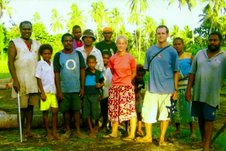
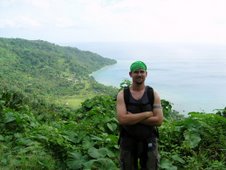
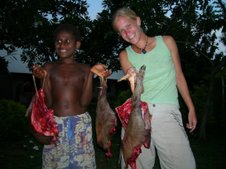
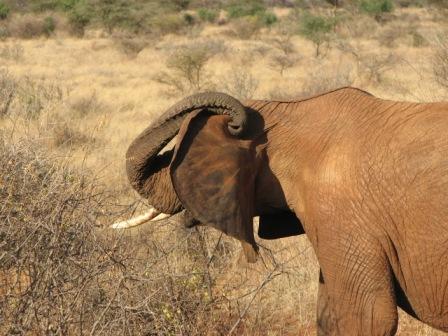
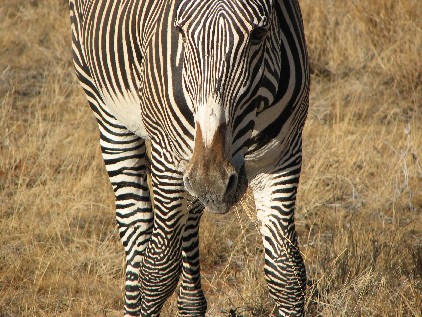
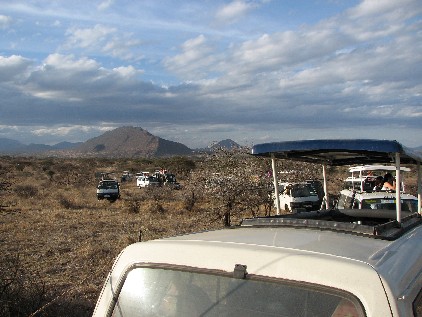
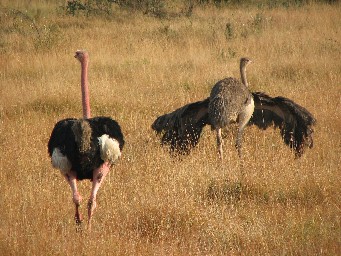

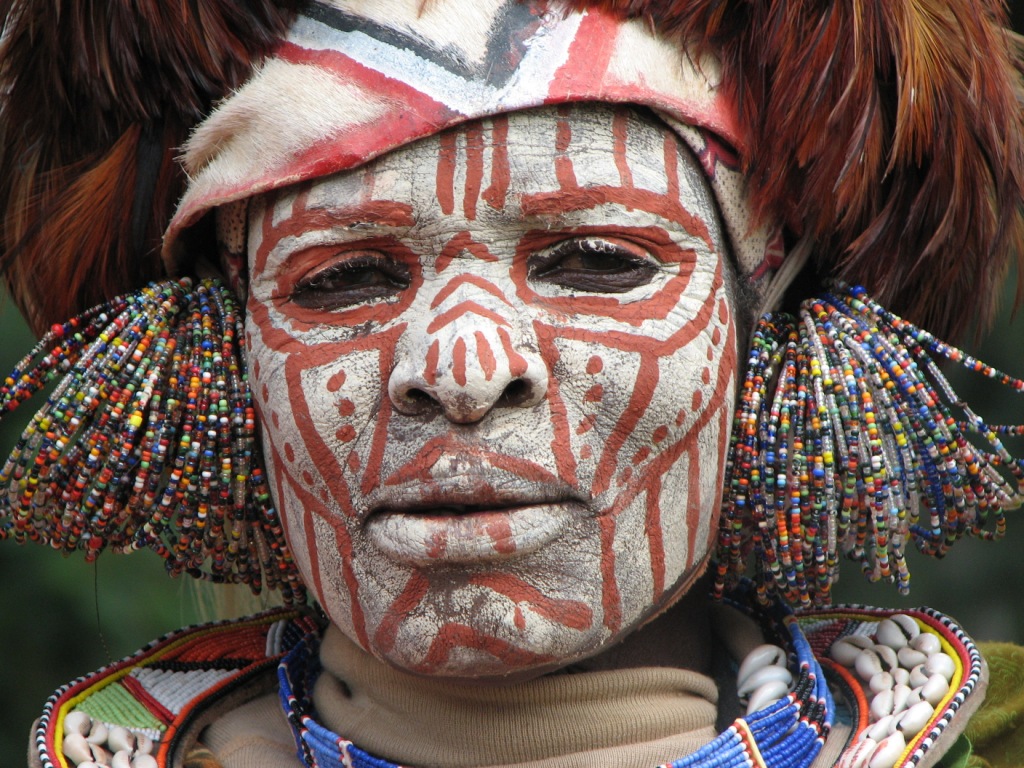
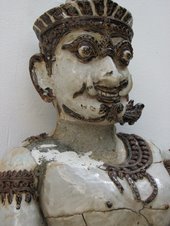
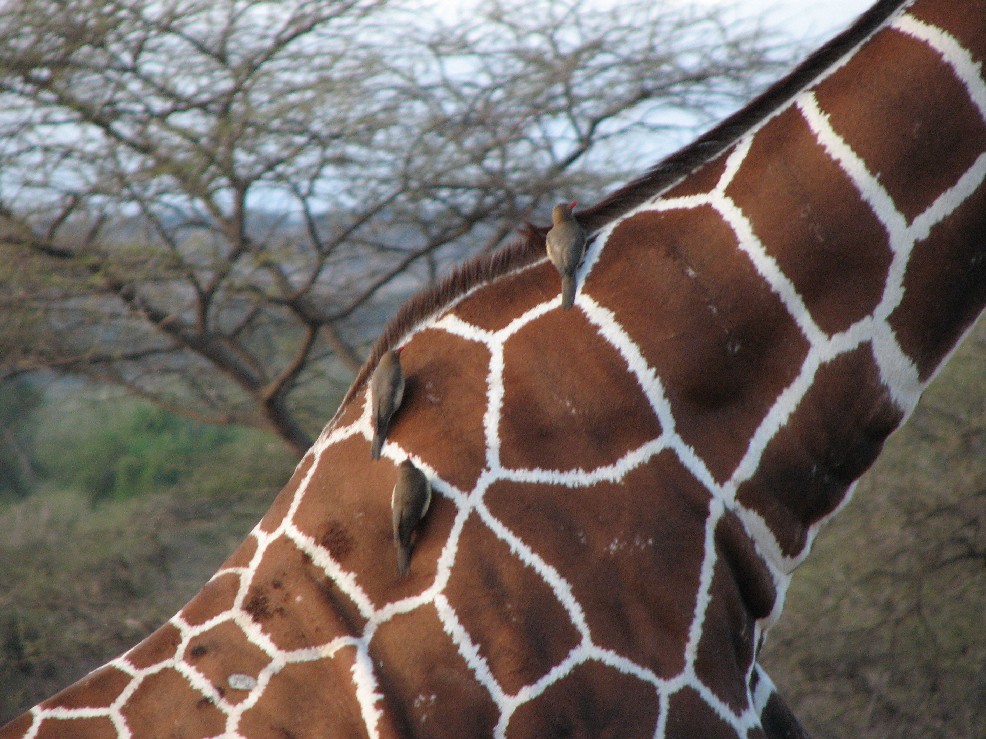
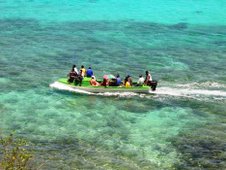
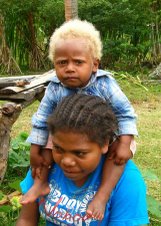
No comments:
Post a Comment